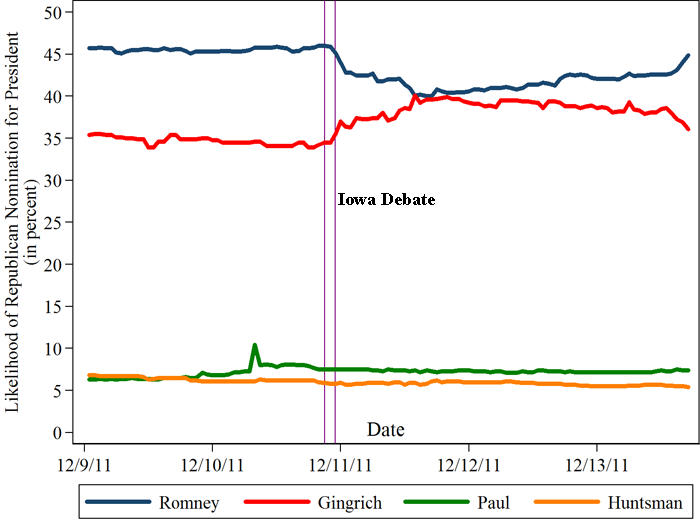How Ron Paul could win nomination
Ron Paul has a 7.5 percent likelihood of winning the Republican nomination, based on data from prediction markets. That puts him in 3rd place, behind Mitt Romney at 47.7 percent and Newt Gingrich at 33.7 percent, but ahead of Jon Huntsman at 5.4 percent.
Real Clear Politics has Paul at 9.3 percentage points in its latest aggregated poll trend for the Republican primary. Among active candidates, that puts him 3rd behind Gingrich at 33.3 percentage points and Romney at 22.0 percentage points. The prediction markets and polls paint a picture of the race for the Republican nomination that contrasts with many indicators talked about on the internet.
Ron Paul is by far the most popular candidate in The Signal's comment section. In every article we post there are streams of comments on Ron Paul. First, thank you for commenting! We appreciate that you are reading the articles and taking the time to comment on them. Yet, the readership of The Signal is not a representative sample of the relevant electorate and the subset of The Signal's readers that choose to post comments are an even less representative subset of the relevant electorate. Thus, being the most popular among those people who comment on this website is not a powerful indicator of the election outcome. What matters is the popularity among those people that will participate in the Republican primary contests.
Ron Paul is leading or in second place in many straw polls, but again, these are not representative samples of the relevant electorate. Straw polls are conducted among a self-selected group of highly motivated members of the electorate. They indicate strong and dedicated support, an important attribute in elections. But, elections are decided across a much larger electorate that does not resemble this smaller subgroup.
Similarly, Paul dominates positive tweets in an atmosphere that is incredibly negative. But, tweets originate from an unrepresentative segment of the electorate who can "vote" many, many times.
Prediction markets are the most efficient predictor of election results and they give Paul a non-negligible, but small likelihood of winning the Republican nomination. A prediction market allows political handicappers to back up their convictions with real money. The price is an aggregate reflection of how much people are willing to pay for contracts that expire at $1 if Paul wins the nomination and $0 if he does not. Users from around the world act based on any information they have, including well-known central signals of upcoming events like polls and past results, as well as less obvious, more disaggregated indicators.
Even if Ron Paul wins Iowa, where he is currently trailing only Gingrich, he faces a very difficult struggle to win the Republican nomination. A loss to Paul would greatly diminish Gingrich's position as the anyone-but-Romney candidate. There is a high likelihood that Paul would become the anyone-but-Romney candidate, but that is not guaranteed. So, if Paul is 28.8 percent likely to win Iowa, that mean he has at most a 28.8 percent likelihood of becoming the anyone-but-Romney candidate as a result of the Iowa Caucus.
Even if Paul becomes the anyone-but-Romney candidate, Romney would still be favored to win the nomination; Ron Paul is a very principled and disciplined libertarian, which does not put him near the mainstream Republican platform. As a libertarian, Paul has been very consistent in his belief in small government; he advocates little interference in domestic social policy, domestic economic policy, and foreign policy. Many of the leading Republican politicians have advocated a hands-off approach to the economy, but their record runs the spectrum from true libertarians to heavy influence on the side of certain businesses. Yet, the Republican party has at best mixed platform on government influence on social domestic policy and foreign policy, and very little interest in trimming military spending.
Iowa is Paul's best hope of an early victory; a loss there would be devastating to his nomination hopes.
When I predict the outcome of the Republican primary, I am predicting what the data tells me what will happen, not what I wish would happen. I applaud Paul's strength of conviction, both when I agree and disagree with him. Paul's main path to victory is winning Iowa, becoming the anyone-but-Romney candidate and then beating Romney. Accomplishing all three is an unlikely, but possible task and that is why the prediction markets have Paul at 7.4 percent to gain the nomination.
So, I pose the question to you, what do you think Paul's path to the nomination looks like? Follow along on PredictWise for real-time likelihoods of the Republican nomination and the individual Republican primaries.
David Rothschild is an economist at Yahoo! Research. He has a Ph.D. in applied economics from the Wharton School of Business at the University of Pennsylvania. His dissertation is in creating aggregated forecasts from individual-level information. Follow him on Twitter @DavMicRot and email him at thesignal@yahoo-inc.com.
Other popular Yahoo! News stories:
In Republican debate, Gingrich and Romney make big bets
Newt Gingrich reminds staff and surrogates: Do not go negative in the primaries
Mitt Romney in 2002: 'My views are progressive'
Want more? Visit The Signal blog or connect with us on Facebook and follow us on Twitter.



